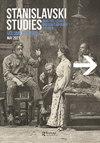Zero zone in Stanislavski’s practice
IF 0.1
0 THEATER
引用次数: 2
Abstract
ABSTRACT The current provocation explores what could be behind Konstantin Stanislavski’s claim that his teaching is neither a method nor a system, as it is unfinished. Alongside the complex of techniques and the worldwide influence it has on contemporary performing art, was there a special area that the master perceived incomplete? Could this be connected to authoritarian theatre-making (which has been recently acknowledged in the field), where the relationship in the actor-director dyad remains hierarchical and evokes a continuous conflict (as a manifestation of stage fright) between them? I argue that on Stanislavski’s personal path as an actor from stage fright to self-confidence, alongside the practical exercises which he designed according to Yoga, he also perceived the importance of Vedic philosophy itself to the performing arts. Via application of Stanislavskian craft, one can experience the absolute truth and higher consciousness, which could replace the internal and external confrontation with fruitful creative outcomes in a rehearsal studio – if practiced perfectly. Unfortunately, the methodology to support the philosophical (ethical) side of the system remained undeveloped by him when he passed away. Zero Zone unique psychosomatic praxis is designed according to Yogic Abhyasa and Vairagya principles to enhance the exchange between actor and director in the creative process to reach the higher aims, described already by Stanislavski. The current paper supports writings on the spiritual aspect of the Stanislavskian system, self-cultivation practices in performing arts and executive coaching.斯坦尼斯拉夫斯基实践中的零区
当前的挑衅探讨了康斯坦丁·斯坦尼斯拉夫斯基声称他的教学既不是一种方法也不是一种系统,因为它是未完成的,背后可能是什么。除了复杂的技术和它对当代表演艺术的全球影响之外,大师是否认为有一个特殊的领域是不完整的?这是否与专制的戏剧制作有关(最近在该领域得到了承认),演员和导演之间的关系仍然是等级分明的,并引发了他们之间持续的冲突(作为怯场的表现)?我认为,在斯坦尼斯拉夫斯基作为一名演员从怯场到自信的个人道路上,除了他根据瑜伽设计的实践练习外,他还意识到吠陀哲学本身对表演艺术的重要性。通过斯坦尼斯拉夫斯基工艺的应用,可以体验到绝对的真理和更高的意识,如果练习完美,可以在排练室中以富有成效的创造性成果取代内外对抗。不幸的是,当他去世时,支持这个体系的哲学(伦理)方面的方法论仍然没有发展起来。Zero Zone独特的身心实践是根据Yogic Abhyasa和Vairagya原则设计的,旨在加强演员和导演在创作过程中的交流,以达到Stanislavski已经描述的更高目标。目前的论文支持关于斯坦尼斯拉夫斯基体系的精神方面、表演艺术中的自我修养实践和高管培训的写作。
本文章由计算机程序翻译,如有差异,请以英文原文为准。
求助全文
约1分钟内获得全文
求助全文

 求助内容:
求助内容: 应助结果提醒方式:
应助结果提醒方式:


